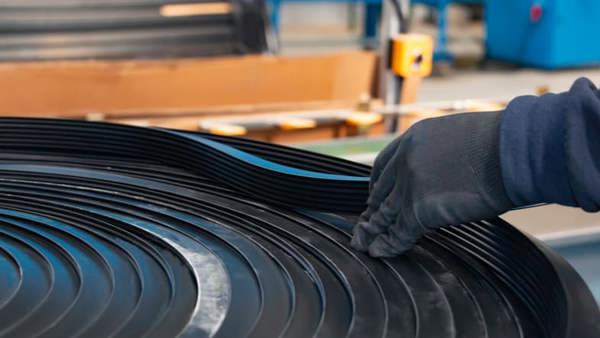
There are a wide variety of rubber and plastic materials used to manufacture parts. Appropriately enough, choosing the right material can be a make-or-break situation when it comes to tensile strength.
Simply put, some materials are better at being stretched or pulled without breaking. It’s important to find the right match for your tensile strength needs, so keep reading to find a breakdown of tensile ranges and maximum elongation for different rubber and plastic materials.
Rubber Tensile Strength Ranges
EPDM tensile strength
Tensile Range: 500-2500 P.S.I.
Elongation: 600% Maximum
Other Key Benefits:
- Excellent resistance to UV exposure, ozone, aging, weathering.
- Exceptional physical durability.
Silicone tensile strength
Tensile Range: 200-1500 P.S.I.
Elongation: 700% Maximum
Other Key Benefits:
- Superior temperature resistance compared to most rubber and plastic compounds.
- Compression set resistance, insulation from electricity, and ability to repel water make silicone an excellent material for gaskets, seals, and tubing.
Neoprene tensile strength
Tensile Range: 500-3000 P.S.I.
Elongation: 600% Maximum
Other Key Benefits:
- Thrives in environments with intermittent exposure to oil and petroleum.
- Combination of weathering resistance and low compression set make neoprene a versatile material for outdoor applications.
Nitrile tensile strength
Tensile Range: 200-3000 P.S.I.
Elongation: 600% Maximum
Other Key Benefits:
- Withstands prolonged exposure to petroleum-based, mineral, and vegetable oils.
- Resistance to heat aging allows nitrile parts to not harden and lose their damping capability as quickly as other materials.
Viton tensile strength
Tensile Range: 500-2000 P.S.I.
Elongation: 300% Maximum
Other Key Benefits:
- Strong reputation as a high-performance elastomer for very hot and extremely corrosive environments.
- Meets strict environmental regulations regarding emissions, spills, and leaks.
Natural rubber tensile strength
Tensile Range: 500-3500 P.S.I.
Elongation: 700% Maximum
Other Key Benefits:
- Superior resistance to part fatigue.
- Ideal for applications that deal with regular vibration, noise, contact, and issues that require exceptional physical durability.
Butyl rubber tensile strength
Tensile Range: 500-2500 P.S.I.
Elongation: 600% Maximum
Other Key Benefits:
- Airtight and gas impermeability.
- Combination of durability and flexibility provides tremendous shock absorption capabilities.
PVC tensile strength
Tensile Strength: 2.60 N/mm2
Elongation: 400% Maximum
Other Key Benefits:
- Easy to process and blend into both rigid and soft materials.
- Extremely lightweight material that is excellent for weight reduction.
Thermoplastic elastomer (TPE) tensile strength
Tensile Range: 500-2500 P.S.I.
Elongation: 600% Maximum
Other Key Benefits:
- Soft touch is appealing for consumer goods and other parts.
- Can be repeatedly stretched to at least twice its original length at room temperature and return to its original approximate length.
Invest in the Parts That Match Your Tensile Strength Requirements
The most effective parts are made when you identify the ideal material for your performance needs, and tensile strength is no exception. The problem is that even when tensile strength is a major factor, there are always other aspects you need to consider.
It’s Timco Rubber’s goal to help you determine the best, most cost-effective solution for your parts. It is our goal to relentlessly align our capabilities to your unique design, application, and material requirements, while offering you the highest value custom component solution for your business. Give us a call at 800-969-6242 or contact us online to have one of our experts design and supply the right parts for your applications.
